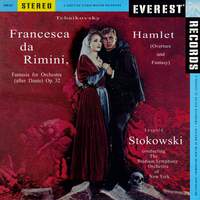I was particularly interested to hear the comments on the tempo of the love theme, confirming what I had thought previously.
BaL 27.04.13 - Tchaikovsky's Hamlet Fantasy Overture Op.67
Collapse
X
-
No (unless I missed it - it certainly didn't feature as a contender). I seem to remember that his equally fabled Francesca was overlooked/ignored whan it was BaL-ed a couple or three years ago.Originally posted by LeMartinPecheur View PostAs per usual, LMP wasn't paying proper attention at the back of the class Did Stoky get a mention??
Did Stoky get a mention??
But I'm grateful for this BaL - I don't remember hearing the work for about twenty years, and the excerpts really brought home to me that this isn't a "second-rate" piece, but one of the composer's best pieces. I want Bernstein (either version) and will seek out Muti in a charity shop. But I also want Poppov - the "Love theme" takes on a lovely Dvorakianly whistful character taken at the metronome mark Tchaikovsky requests. As always, the composer knows best! [FONT=Comic Sans MS][I][B]Numquam Satis![/B][/I][/FONT]
[FONT=Comic Sans MS][I][B]Numquam Satis![/B][/I][/FONT]
Comment
-
-
In the end SW didn't care that much for the Dudamel and Stokowski was not mentioned AFAIK. I liked the Pletnev extracts and agree with SW's preference for a more classical, transparent approach over extravagant expressiveness.
I found the review rather less anchored in exposition about the music than usual and it came across as more of a series of illustrations - perhaps he was assuming a level of knowledge about the work that I didn't have (having only heard it a few times). He pretty well dismissed at the outset, perhaps correctly, any close narrative association of music with the dramatic action of the play though there were some references to music illustrating particular events, e.g. Hamlet's death.
Comment
-
-
I agree, ferney, though I think I prefer Francesca. I'd like to seek out the Stoky that is so highly regarded and perhaps the Pletnev.I don't remember hearing the work for about twenty years, and the excerpts really brought home to me that this isn't a "second-rate" piece, but one of the composer's best pieces.
Comment
-
-
There seem to be varying opinions on how closely the music follows the action of the play. I found these comments in a programme note for a Baltimore SO concert:
"Indeed, correspondences to elements of Shakespeare’s plot in Tchaikovsky’s tone poem are rather ambiguous. Rather than following a dramatic scenario, the Hamlet Overture is more a series of portraits of psychological states. Musically, it is a sonata form in F minor with a slow introduction, but without a true development section.
In a tempo marked Lento lugubre, the music opens in a mood of dark foreboding. Violas and cellos sing a brooding melody with a pronounced downward trajectory: this is the theme of Fate, which constrains Hamlet’s actions. With a crash of the tam-tam, the ghost of Hamlet’s father appears, demanding retribution.
The main Allegro vivace section then presents a more active, upward-striding theme, representing Hamlet’s desire to avenge his father’s murder. Coming from a different harmonic and emotional world is Ophelia’s beautiful second-subject music in B minor, a tritone away from Hamlet’s F minor. A solo oboe represents her in one of Tchaikovsky’s most poignantly haunting melodies, and a romantic, balletic love scene between the two follows. The exposition section closes with resolute military-march music: this stands for the Norwegian Prince Fortinbras, who will ultimately rescue the situation at Elsinore.
Bypassing a development section, the music returns to more elaborately scored versions of Hamlet’s active theme and Ophelia’s romantic song. As Hamlet moves toward his doom, trombones roar the opening Fate theme. Hamlet fights his fatal duel with Laertes, and a brutal clash signals his death. A quiet epilogue, with strings solemnly reprising the Fate theme, mourns his end."
Do those here who know the music better than I do (i.e. most) think this is a plausible commentary?
Comment
-
-
It's new cover is one of the worst I have ever seen !Originally posted by Eine Alpensinfonie View Post
Comment
-
-
I think I remember that as the original Everest LP cover. My UK reissue by Transatlantic Records might top it for you barbs - a modernistic blue vortex with Paolo and an improbably blonde Francesca, naturalistically stark naked, backs flattened against the wall, spiraling downwards to its hot yellow/orange end.Originally posted by Barbirollians View PostIt's new cover is one of the worst I have ever seen !I keep hitting the Escape key, but I'm still here!
Comment
-
-
The Stokowski is indeed available, not only from Presto but also via Amazon in a variety of CD releases as well as MP3 downloads ...
How Walsh can have ignored it completely is quite incredible. This recording was raved over in the Gramophone both by Deryck Cooke ("Stokowski brings to it a precision, drive and intensity that one can only marvel at") and Trevor Harvey ("staggeringly fine performance ... very great conducting and interpretation") so its omission today was, as Barbirollians remarks, a joke. And there were many other fine conductors of the work, listed in #1 at the start, who ought to have made it onto the programme too, such as Monteux and Svetlanov, whose versions might well have deserved a short excerpt.
Comment
-




Comment